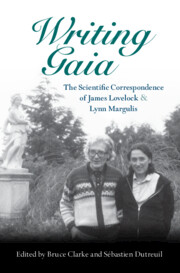Book contents
- Writing Gaia: The Scientific Correspondence of James Lovelock and Lynn Margulis
- Reviews
- Writing Gaia: The Scientific Correspondence of James Lovelock and Lynn Margulis
- Copyright page
- Epigraph
- Table of Contents
- Figures
- Contributors
- Foreword by James Lovelock
- Preface
- Acknowledgements
- Introduction
- Part I 1970–1972
- Part II 1973–1979
- Part III 1980–1991
- Part IV 1992–2007
- Part V Commentaries on Lovelock and Margulis
- Darwinizing Gaia
- Gaia at the Margulis Lab
- Gaia and the Water of Life
- Gaia as a Problem of Social Theory
- Befriending Gaia: My Early Correspondence with Jim Lovelock
- Gaia’s Pervasive Influence
- Gaia’s Microbiome
- Tangled Up in Gaia
- Lovelock and Margulis
- Discovering Geology, Discovering Gaia
- Glossary of Names
- Glossary of Terms
- Bibliography
- Index
Befriending Gaia: My Early Correspondence with Jim Lovelock
from Part V - Commentaries on Lovelock and Margulis
Published online by Cambridge University Press: 28 July 2022
- Writing Gaia: The Scientific Correspondence of James Lovelock and Lynn Margulis
- Reviews
- Writing Gaia: The Scientific Correspondence of James Lovelock and Lynn Margulis
- Copyright page
- Epigraph
- Table of Contents
- Figures
- Contributors
- Foreword by James Lovelock
- Preface
- Acknowledgements
- Introduction
- Part I 1970–1972
- Part II 1973–1979
- Part III 1980–1991
- Part IV 1992–2007
- Part V Commentaries on Lovelock and Margulis
- Darwinizing Gaia
- Gaia at the Margulis Lab
- Gaia and the Water of Life
- Gaia as a Problem of Social Theory
- Befriending Gaia: My Early Correspondence with Jim Lovelock
- Gaia’s Pervasive Influence
- Gaia’s Microbiome
- Tangled Up in Gaia
- Lovelock and Margulis
- Discovering Geology, Discovering Gaia
- Glossary of Names
- Glossary of Terms
- Bibliography
- Index
Summary
I first encountered Gaian ideas as an 18-year-old undergraduate returning home for Christmas 1991 from a first term studying Natural Sciences at the University of Cambridge. I had been thrilled to make it to Cambridge from my local comprehensive school. Science was my calling, having avidly consumed popular science throughout my teenage years. But the university seemed full of over-confident rich kids keener on making a social impression than an intellectual one. Looking back, it was uncannily like Tom Sharpe’s hilarious book Porterhouse Blue.580 Meanwhile, I was stuck in the library until 11:00 pm most nights trying to get on top of the mathematics and physics curriculum. I was also troubled by the ozone hole, global warming, Amazon deforestation, and the overall sense that humans were destroying the Earth. Yet the best our lectures could suggest as a career path was “chemical engineer.” Into this mental melting pot my dad gave me Gaia: A New Look at Life on Earth and The Ages of Gaia: A Biography of our Living Earth as Christmas presents. I devoured both and was captivated by this new world view. At the end of Ages of Gaia, Jim Lovelock calls for practitioners of planetary medicine and asks: “Is there a doctor out there?” I decided to answer Jim’s call: In early 1992 I wrote him a letter saying I would like to join the quest and research Gaia when I graduated. He generously invited me to visit Coombe Mill in summer 1992.
- Type
- Chapter
- Information
- Publisher: Cambridge University PressPrint publication year: 2022

